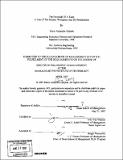The downfall of a team : a tale of the modern workplace and de-socialization
Author(s)
Quijada, Maria Alejandra
DownloadFull printable version (9.944Mb)
Other Contributors
Sloan School of Management.
Advisor
John Van Maanen.
Terms of use
Metadata
Show full item recordAbstract
My dissertation presents the results of a year long ethnographic study of software engineers. The study defines the process of de-socialization as the decay of the results of the socialization process. This process is triggered by changes in the organization that invalidate or limit the validity of the content of previous socialization efforts. Individuals encounter changes that alter the group identity and do not know how to behave in the new world. In its extreme de-socialization can produce a state akin to anomie. The theory is derived from the observed de-evolution of the studied group from what they recall as the good old days, days when they were central to the organization and perceived to be valued, to the sad new days, days when individuals cared little about their project and their firm and felt unappreciated by top management. The process had significant impact on turnover, productivity and organizational citizenship behaviors. Three events acted as triggers for the process of de-socialization. These events were a bout of reorganizations, the acquisition of a new firm, and the changes to the software global labor market. The process of de-socialization results in individuals that have little or no identification with the firm, their workgroup, or their jobs. A model is proposed along with research questions that might guide future research avenues. Proposed interventions to alleviate or stop the de-socialization process are also presented.
Description
Thesis (Ph. D.)--Massachusetts Institute of Technology, Sloan School of Management, 2007. Includes bibliographical references (p. 225-229).
Date issued
2007Department
Sloan School of ManagementPublisher
Massachusetts Institute of Technology
Keywords
Sloan School of Management.